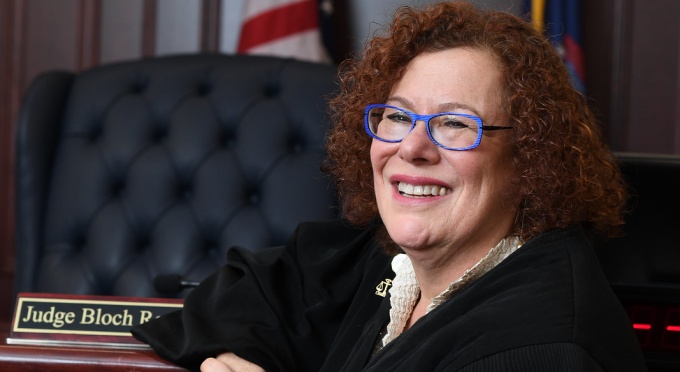
Lisa Bloch Rodwin: Bringing justice to the people
Justice is blind, but it never looks away from the community it serves. And when the world changes, the courts need to change as well.
As a longtime prosecutor in Western New York, Lisa Bloch Rodwin ’85 knew that need all too well. Her pioneering work in prosecuting domestic violence – informed by the emerging understanding of the emotional dynamics of the crime and its targets – created a sea of change in how DV crimes are handled in Erie County. She led the Erie County district attorney’s Domestic Violence Bureau for a dozen years, building a tenacious team of prosecutors. She also established upstate New York’s first Domestic Violence Court and helped set up the county’s first Integrated Domestic Violence Court, which consolidates a single family’s domestic violence and custody cases under a single judge.
After her election to the Family Court bench in 2008 – a post from which she is newly retired – Bloch Rodwin came to realize another court reform was sorely needed. Members of Buffalo’s burgeoning refugee community, with a multiplicity of languages, beliefs and customs from their countries of origin, were beset by mistrust, misunderstanding and fear of the court system.
What’s really special about our community is that the motto City of Good Neighbors is not just a bunch of words. It has meaning. People really care about their neighbors in this community and really want to help one another. They’re willing to try something new to make that happen.
Bloch Rodwin’s solution: the state's first Muslim and Immigrant Family Court Collaborative, which builds bridges to immigrant communities – Burmese and Karen, Nepali, Congolese and Somali – and makes the court system more understandable and accessible.
The effort, begun in 2010, now encompasses more than 250 members, both service providers and community representatives. It has three goals: to teach the judges, lawyers, social workers and probation officers who work with Family Court about these new communities and how best to serve them; to teach immigrant communities about Family Court and how to use it; and to ensure that children who are removed to foster care are placed with foster parents within the same immigrant community.
Toward that end, Bloch Rodwin and other stakeholders worked with imams and other community leaders, and made dozens of presentations with the help of interpreters. They drew 250 Somali immigrants to a Buffalo State College auditorium. In a program held in late 2016, they brought 12 interpreters to Jericho Road Community Health Center for a presentation called “Know Your Rights.” Each community clustered around its own interpreter, and when they all translated at once, “It was like the Tower of Babel,” she says.
Now, immigrants have tools such as a laminated card in court – if they cannot read, they can point to the flag of their country of origin and be provided with an interpreter. The work continues to bridge the gap between new immigrants and the courts that serve them.
Sometimes change is met with resistance, but Bloch Rodwin says this effort to make the court system more accessible has been uniformly welcomed. “What’s really special about our community is that the motto City of Good Neighbors is not just a bunch of words,” Bloch Rodwin says. “It has meaning. People really care about their neighbors in this community and really want to help one another. They’re willing to try something new to make that happen.”